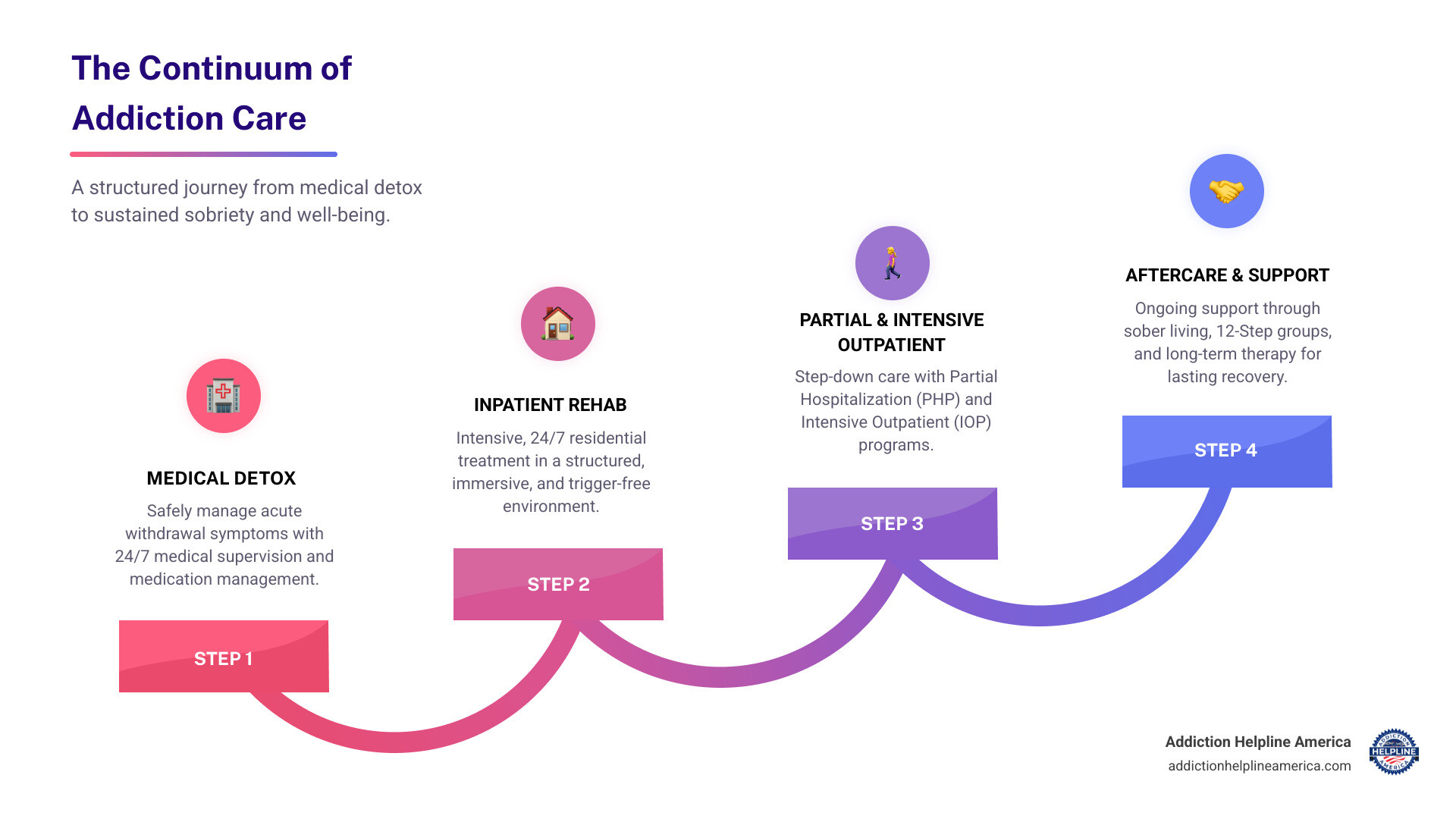
Understanding Your Path to Recovery from Alcohol Addiction
Inpatient alcohol rehab is a residential treatment program where individuals live at a facility while receiving intensive, 24/7 care for alcohol use disorder. It represents the most comprehensive level of care, designed to stabilize, heal, and empower individuals to build a foundation for lasting sobriety.
Key features of this immersive approach include:
- 24/7 Medical Supervision: This is more than just having a nurse nearby. It means constant monitoring during the critical detox phase to manage potentially life-threatening withdrawal symptoms and immediate medical attention for any health issues that arise. This continuous care ensures your physical safety at all times.
- A Structured, Trigger-Free Environment: Addiction thrives in chaos and is often fueled by environmental cues. Inpatient rehab removes you from the people, places, and stressors that trigger the urge to drink. It replaces chaos with a predictable, structured daily schedule of therapy, meals, and activities, helping to restore discipline and healthy routines.
- Integrated Therapeutic Support: Treatment goes beyond just stopping drinking. It involves a combination of evidence-based therapies like individual counseling to uncover the root causes of addiction, group therapy to build peer support, and family therapy to heal relationships. Programs often last 30, 60, or 90 days, depending on individual needs.
- Ideal for Complex Cases: This level of care is particularly effective for those with severe alcohol addiction, a history of relapse, co-occurring mental health conditions like depression or anxiety, or an unstable home environment that undermines recovery efforts.
If you’re struggling with alcohol addiction—or watching someone you love battle this disease—you’re likely feeling overwhelmed, scared, and uncertain about what to do next. The good news is that inpatient alcohol rehab provides a safe, structured path to recovery with professional support every step of the way. It offers a crucial pause from the pressures of daily life, allowing you to focus entirely on your health and well-being.
Inpatient treatment removes you from environments where drinking is normalized or expected and surrounds you with a dedicated team of medical professionals, therapists, and peers who understand the journey to recovery because they are on it with you.
Call Now – Your Journey to Recovery Begins Today!

Take the first step towards a healthier life! Call now to connect with our compassionate team and start your recovery journey today. Your path to healing awaits!
Our recovery specialists are available 24/7 to provide support, and all calls are confidential and free. Reach out anytime – we’re here to help!
At Addiction Helpline America, we understand that navigating treatment options is a daunting task. That’s why we’ve dedicated our work to connecting individuals and families with the right resources. We don’t just give you a list of names; our addiction specialists and recovery advocates listen to your unique story, understand your specific needs, and provide personalized guidance on inpatient alcohol rehab options. We are available 24/7 to help you understand your choices and take that crucial first step toward healing.

Inpatient alcohol rehab glossary:
What is Inpatient Alcohol Rehab and Who Is It For?
When you’re struggling with alcohol use disorder, or watching someone you love battle this disease, the options for treatment can feel overwhelming. Inpatient alcohol rehab—sometimes called residential treatment—offers one of the most comprehensive paths to recovery available today.
At its core, inpatient alcohol rehab means you live at a treatment facility for the duration of your program. You’re not just visiting for therapy appointments and then heading back home. Instead, you’re completely immersed in a healing environment where every aspect of your day is structured to support your recovery. This means round-the-clock medical supervision, immediate access to therapists and counselors, and a community of peers who understand exactly what you’re going through.
Call Now – Your Journey to Recovery Begins Today!

Take the first step towards a healthier life! Call now to connect with our compassionate team and start your recovery journey today. Your path to healing awaits!
Our recovery specialists are available 24/7 to provide support, and all calls are confidential and free. Reach out anytime – we’re here to help!
The beauty of this approach lies in what it removes: the everyday triggers, stressors, and temptations that fuel addiction. When you step into an inpatient alcohol rehab program, you’re stepping away from the bars you used to frequent, the friends who encouraged your drinking, the stress of work deadlines, and even the familiar patterns of your daily routine. This distraction-free setting creates space for deep healing work that’s simply harder to achieve when you’re still navigating the same environment where your addiction developed.
To help you understand how inpatient care differs from other options, here’s a comparison:
| Feature | Inpatient Alcohol Rehab | Outpatient Alcohol Rehab |
|---|---|---|
| Living Situation | Live at the facility 24/7 during treatment | Live at home, attend scheduled sessions |
| Medical Supervision | Round-the-clock care from medical staff | Limited to appointment times |
| Structure | Highly structured daily schedule | More flexible, self-directed |
| Environment | Controlled, trigger-free therapeutic setting | Real-world environment with potential triggers |
| Support Level | Intensive, immediate support available anytime | Support during scheduled appointments |
| Best For | Severe AUD, unstable home life, co-occurring disorders, history of relapse | Mild to moderate AUD, stable home environment, strong support system |
So who truly benefits from this level of care? We’ve found that inpatient alcohol rehab is particularly effective for several groups of people. If you’re dealing with severe alcohol use disorder—meaning alcohol has taken over significant parts of your life and you’ve struggled to cut back on your own—residential treatment provides the intensive support you need. Similarly, if your home environment isn’t conducive to recovery (perhaps others in your household drink, or there’s instability or conflict), removing yourself from that setting becomes crucial.
Many people who enter inpatient care are also dealing with co-occurring mental health disorders like anxiety, depression, or PTSD. These conditions often intertwine with alcohol addiction, creating a complex web that requires specialized, integrated treatment. And if you’ve tried outpatient treatment before but found yourself relapsing, inpatient care offers a fresh start with more comprehensive support.
If you’re looking for treatment options and want to explore what’s available in your area, we recommend checking out SAMHSA’s treatment directory, which can help you locate facilities nationwide.
The Critical Role of Medical Detox
Before the therapeutic work of recovery can truly begin, your body needs to safely withdraw from alcohol. This is where medical detox becomes absolutely essential—and it’s one of the most important reasons to choose inpatient care over trying to quit on your own.
Alcohol withdrawal syndrome (AWS) isn’t just uncomfortable; it can be dangerous, and in some cases, life-threatening. When your body has become dependent on alcohol, suddenly stopping causes a cascade of physical reactions as your central nervous system rebounds. Symptoms often begin within 6 to 12 hours of the last drink and can include tremors (the “shakes”), sweating, rapid heartbeat, nausea, severe anxiety, and insomnia. These symptoms typically peak within 24 to 72 hours. The most serious risk is Delirium Tremens (DTs), a severe form of withdrawal that can occur 48 to 96 hours after stopping. DTs are a medical emergency characterized by profound confusion, agitation, hallucinations, fever, seizures, and dangerously high blood pressure.
This is precisely why attempting to detox alone is so risky. In an inpatient alcohol rehab setting, you undergo detox with 24/7 nursing care where your vital signs and symptoms are constantly monitored. Medical professionals can provide FDA-approved medication management, often using benzodiazepines to calm the nervous system, prevent seizures, and reduce the severity of other symptoms. They also provide crucial supportive care, such as IV fluids to combat dehydration and nutritional supplements (like thiamine) to address deficiencies caused by chronic alcohol use. This comprehensive medical stabilization ensures your safety and comfort during what can be one of the most challenging phases of recovery, creating a stable foundation for the therapeutic work ahead. You can’t focus on healing your mind when your body is in crisis.
Call Now – Your Journey to Recovery Begins Today!

Take the first step towards a healthier life! Call now to connect with our compassionate team and start your recovery journey today. Your path to healing awaits!
Our recovery specialists are available 24/7 to provide support, and all calls are confidential and free. Reach out anytime – we’re here to help!
Who Benefits Most from Inpatient Care?
While we’ve touched on this already, it’s worth diving deeper into the specific situations where inpatient alcohol rehab truly shines. The severity of your addiction plays a significant role in determining the right level of care. If alcohol has become central to your daily functioning—if you need it to feel normal, if you’re drinking throughout the day, or if your attempts to stop on your own have failed repeatedly—inpatient treatment provides the intensive intervention you need.
Your support system (or lack thereof) also matters tremendously. Recovery is challenging under the best circumstances, but if you don’t have sober, supportive people around you at home, trying to maintain sobriety while living in the same environment where you drank becomes exponentially harder. Inpatient alcohol rehab surrounds you with a built-in support network of professionals and peers who are all focused on the same goal: lasting recovery.
If you’ve tried outpatient treatment before without success, that’s not a failure—it’s valuable information. It tells us that you need a more intensive level of care, one that removes you from your triggers and provides more structure and support. Think of it like this: if you broke your leg and tried to heal it while continuing to walk on it every day, it wouldn’t heal properly. Sometimes you need to completely remove the stress on the injury to allow proper healing.
For individuals requiring dual diagnosis treatment—meaning you’re dealing with both alcohol addiction and mental health conditions—inpatient care offers integrated treatment that addresses both issues simultaneously. This is crucial because treating one without the other rarely leads to lasting recovery. The depression that fueled your drinking won’t magically disappear just because you stop drinking, and vice versa.
Finally, some people simply need a complete environmental change to break the cycle of addiction. If your current environment is saturated with reminders of drinking, toxic relationships, or overwhelming stress, stepping into a completely different setting can provide the reset you need to build new, healthier patterns.
Our helpline is 100%
free & confidential
If you or someone you care about is struggling with drug or alcohol addiction, we can help you explore your recovery options. Don’t face this challenge alone—seek support from us.
Inpatient Alcohol Rehab: 24/7 Professional Support & Care
Resources
Will my insurance
cover addiction
treatment?
We're ready to help
Find the best
drug or alcohol treatment
center
Are you or a loved one struggling with addiction? Call today to speak to a treatment expert.















